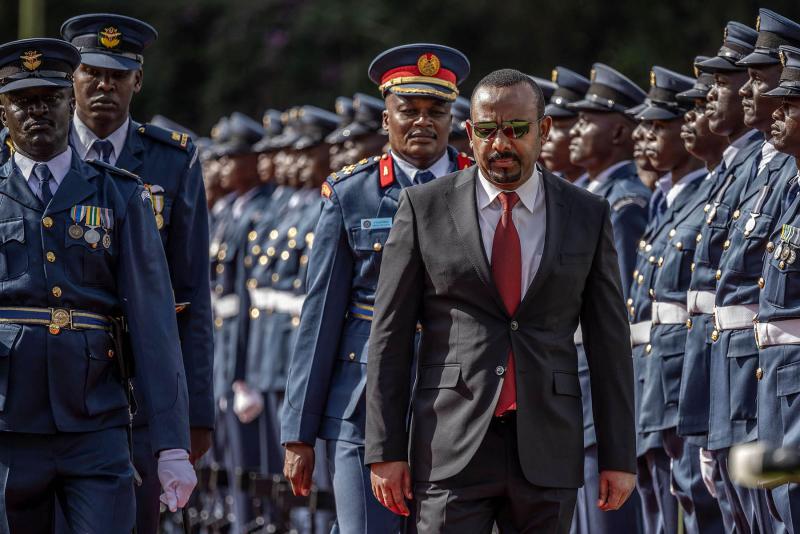“We will not be touched! However, we will humiliate anyone who dares to threaten us in order to dissuade them,” Abiy said.
Ethiopian Prime Minister Abiy Ahmed warned on Sunday that his country would “humiliate” any nation that threatens its sovereignty, in an escalation of the war of words after Egypt signed a security pact last month with Somalia.
Ethiopia is locked in a dispute with neighbouring Somalia over a maritime deal it signed with the breakaway region of Somaliland. Relations with Egypt are also fraught over Ethiopia’s mega-dam on the Blue Nile with Cairo increasingly signalling its willingness to get involved in Horn of Africa’s disputes while seemingly seeking to settle scores with Addis Ababa.
“We will not be touched! However, we will humiliate anyone who dares to threaten us, in order to dissuade them,” Abiy said at a Sovereignty Day ceremony in the capital Addis Ababa.
“We won’t negotiate with anyone on Ethiopia’s sovereignty and dignity,” he was quoted as saying by the official Ethiopian News Agency.
Ethiopia last month accused unnamed actors of seeking to “destabilise the region” after Egypt sent military equipment to Somalia following the signing of a military cooperation pact between Cairo and Mogadishu.
Egypt has also offered to deploy troops to Somalia under a new African Union-led mission that will replace the current peacekeeping force known as ATMIS next year.
Ethiopia is currently a major contributor to ATMIS, which is helping Somali forces in the fight against the Al-Shabaab jihadist group.
But Mogadishu is furious over a deal signed in January between Ethiopia and Somaliland that gives Addis Ababa long-sought access to the sea, saying it was an attack on its sovereignty and territorial integrity.
Under the pact, Somaliland agreed to lease 20 kilometres of its coast for 50 years to Ethiopia, which wants to set up a naval base and a commercial port on the coast.
In return, Somaliland has said Ethiopia would give it formal recognition, although this has never been confirmed by Addis Ababa.
Turkey has been mediating indirect talks between Ethiopia and Somalia to try to resolve the dispute, but there has been no significant breakthrough.
Somaliland, a former British protectorate of 4.5 million people, declared independence in 1993 but the move is rejected by Mogadishu and not recognised by the international community.
Cairo and Addis Ababa have been at loggerheads for years, trading incendiary words over Ethiopia’s massive hydroelectric dam project, which Egypt says threatens its fragile water security.
In recent weeks, Egypt showed signs of opting for a potentially risk-laden approach in its showdown with Ethiopia over the Nile Dam by delivering its first military aid to Somalia in more than four decades, a move likely to deepen strains between the two countries, which could spark a proxy-conflict in eastern Africa.
Two Egyptian military planes arrived at Mogadishu airport late August with weapons and ammunition.
Egypt and Somalia have drawn closer together this year after Ethiopia signed the preliminary coastal land lease deal with breakaway Somaliland.
The Mogadishu government has called the deal an assault on its sovereignty and said it will block it by all means necessary. Landlocked Ethiopia says it needs access to the sea.
Egypt, at odds with Ethiopia for years over Addis Ababa’s construction of the vast hydro dam on the headwaters of the Nile River, has condemned the Somaliland deal.
Their row resurfaced recently after the Grand Ethiopian Renaissance Dam (GERD) authority said it is now generating 1,550 megawatts of electricity.
“The overall progress of the GERD has now transitioned from construction phase to operation phase,” with the building of the dam completed, said the authority.
Cairo signed a security pact with Mogadishu in August and offered to send troops to the new peacekeeping mission in Somalia.
The agreement was inked in Cairo after talks between Egyptian President Abdel Fattah al-Sisi and Somali President Hassan Sheikh Mohamud, who said the “historic pact is a testament to a future of common defence against international terrorism that Somalia is battling at home and abroad.”
Egypt’s offer to contribute troops to the new peacekeeping mission to be launched next year in Somalia was announced in an African Union communiqué earlier this month.
Major General Nasr Salem, an advisor at the Nasser Military Academy affiliated with the Egyptian army, said that military cooperation with Somalia comes within Egypt’s drive to protect its vital interests which extend to the sources of the Nile and to the Red Sea.
He told The Arab Weekly that supplying weapons and building strong military relations with Somalia “would contribute to securing Egyptian interests in neighbouring areas, specifically in the Gulf of Aden and the Red Sea, which ultimately leads to safeguarding Egyptian national security.”
*
ADDIS ABABA/ CAIRO
He added that Egypt-Somalia military cooperation is “a message of deterrence to Ethiopia and a signal that any region is within Egypt’s reach if it poses a threat to it.”
But some experts see risks for Egypt and Somalia.
Cairo’s moves could provoke a regional military escalation. “If the Egyptians put boots on the ground and deploy troops along the border with Ethiopia, it could bring the two into direct confrontation,” said Rashid Abdi, an analyst with the Sahan Research think-tank based in Somalia.
“The threat of a direct shooting war is low, but a proxy conflict is possible.”






